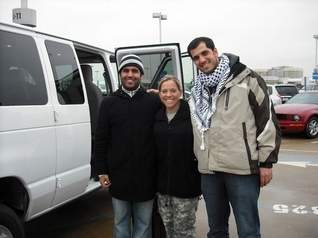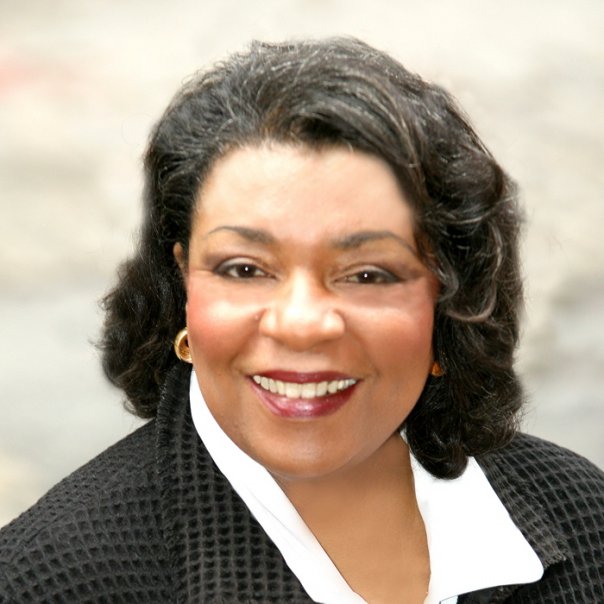 Landmark Education graduate and army lieutenant colonel Martha Granger was recently featured in the Springfield News-Leader for assisting nine foreign Fulbright scholars whose planned tour of the United States was about to fall through.
Landmark Education graduate and army lieutenant colonel Martha Granger was recently featured in the Springfield News-Leader for assisting nine foreign Fulbright scholars whose planned tour of the United States was about to fall through.
Discovering America's Goodness
by Linda Leicht
A trip to the United States for a year on a Fulbright Scholarship was an opportunity of a lifetime that turned into a life-changing experience for the scholars.
Nine scholars, all Muslim from the Middle East, arrived in August, each going to a different college or university to teach Arabic. Two are in Springfield.
Salah Fokrah, a Palestinian from Israel, is at Drury University, and Abdelkarim Moukrime from Morocco is at Missouri State University.
They have learned a lot about American life, but a trip to the East Coast over the Christmas break taught them something about Americans and the possibilities for friendship and trust.
In Washington, D.C., the nine scholars met a remarkable woman, Martha Granger, who turned what could have been a major disappointment into a wonderful experience.
"How great this person is," said Fokrah, 26. "We really love her."
Moukrime, 25, shared that sentiment. "We discovered a good image of the American individual," he said. "I will never forget that, actually."
Fateful encounter
The story begins shortly before Christmas, when the nine friends attended a Fulbright workshop in Washington. They had been planning to go on a road trip up the coast in a rented van.
Fokrah made the arrangements to book the van.
"Unfortunately, nothing worked as was planned," he said.
When he showed up to get the van, he was told that his debit card could not be used unless the full amount, about $2,000, was in his account. He gathered the money from each of the friends and wired it to Springfield for another friend to deposit for him.
But, again, the company would not rent him the van, this time saying that a credit check showed that he had no credit history. He went back and forth to the airport rental car office over three days, trying to satisfy all requirements .
Trying one last time, feeling defeated before he even arrived, Fokrah, along with two friends, were riding the Metro train when a stranger sat next to him.
It was Granger, a 42-year-old Army lieutenant colonel who works at the Pentagon. She began talking to Fokrah and learned about their dilemma.
"She wished us good luck and got off at the Pentagon stop," Fokrah recalled.
As the three friends were dragging their luggage back to the car rental office, Granger began thinking about the conversation.
"I realized I had made a mistake (by leaving them)," she said. "This was put before me for a reason."
She felt strongly that she needed to follow up.
"If I had left the situation, I would have left God's plan."
She recalled the name of the rental company and called, explaining to the incredulous clerk that she wanted to speak to the young people she met on the train.
Fokrah was surprised to hear the familiar voice on the phone asking him if there was anything she could do to help.
That help came in a surprising way to the scholars and to Granger. She came down to the office and used her own credit card to rent the van, putting Fokrah on the application as driver.
"I asked her how do we get the money back to her," Fokrah said. "She said, 'Don't worry about it now. Go on your trip and have a good time.'"
For Maysa Abu Amar, 22, also of Israel, who was also on the train, it was unbelievable.
"I couldn't believe that she called," said Abu Amar from the University of Florida, where she is teaching. "It was like we were on the Oprah show."
What happened next was even more amazing.
Granger began contacting friends, family and former West Point classmates, asking them to help make the nine scholars feel welcome on their travels.
"Some of her friends welcomed us into their houses … nine Arab strangers," said Abu Amar.
Some of their hosts had never even met Granger, but had heard the story though mutual friends.
"I felt that maybe Martha has an effect on everybody," Abu Amar said.
Change for the better
Granger is determined to have an effect on the world, something that would not have occurred to her six-and-a- half months ago.
That is when she got sober.
After years of living as a functioning alcoholic, she decided it was time to stop drinking and find the happiness she was looking for.
She began taking self-actualization training through a program called Landmark Education.
"Stopping drinking was just part of it," she explained. "The other part was living life without alcohol."
Learning to do that meant contributing to society. It also meant quieting the negative voices in her head and giving herself over to something beyond herself and to trust.
Committing herself to helping the nine scholars had another important impact on Granger and her continuing sobriety.
"This was my first holiday sober," she said. "Throughout Christmas and New Year's, I had this project. It really sustained me through the holidays … knowing they were there, somebody needed me."
The experience has already changed attitudes that will be shared when the scholars return to Israel, Morocco, Jordan, Libya and Tunisia.
Fokrah admits that his and his neighbors' views about the United States, mostly shaped by Hollywood, were of a dangerous, scary place.
"My surprise was that it was absolutely different," he said. "It is quite positive."


